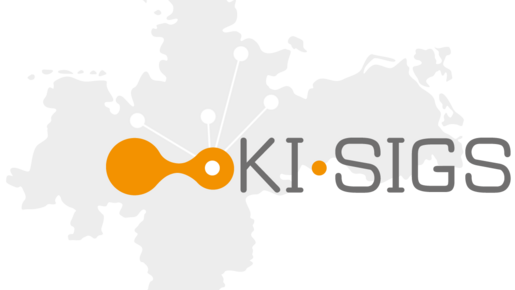A research association led by medical service provider UniTransferKlinik Luebeck is participating in a competition of the Federal Ministry of Economic Affairs and Energy (BMBF) titled „Artificial Intelligence as a Driver of Economically Relevant Ecosystems“ with a proposal for the establishment of an AI competence centre for medicine. The project and its proposal were presented by the universities of Luebeck, Kiel, Hamburg and Bremen and the German Research Center for Artificial Intelligence, supported by the state governments of Schleswig-Holstein, Hamburg and Bremen, on 15 August 2019 in Kiel. The association is applying for research funds of roughly 10 million Euro. The consortium consists of 4 universities, 2 research centres, 12 companies and 2 hospitals from Northern Germany.
The concept „KI-Space for Intelligent Health Systems“ (KI-SIGS) aims at addressing the structural change of the economy, labour market and society caused by the digitalisation. The increasing digitalisation in health science, medicine and medical technology is leading to a large number of big, heterogenic, complex and partially unstructured data sets in all areas of life sciences. This data contains great potential for intelligent health systems and adaptive, self-learning AI technologies.
“With KI-SIGS, we want to align the outstanding Northern-German ecosystem for health technology with artificial intelligence. The platform will offer a space for exchange and services in order to introduce AI in medicine effectively into medical care. For this, we developed an extensive research programme with 9 initial projects for innovation and application that cover a vast amount of the health system”, Professor Stefan Fischer, Vice-President for Transfer and Digitalisation at the University of Luebeck, explains.
For the University of Kiel (CAU), Professor Dirk Nowotka, Head of the Task Force for Reliable Systems, points out: “The innovation projects promise technological advancements in different areas of health. I am convinced that KI-SIGS will have a positive impact on the development of artificial intelligence in the area of health during the runtime of the project. With our expertise as a comprehensive university, we want to support this process not only technologically, but also sociologically and ethically.”
The University of Hamburg takes up responsibility for the research and development of medical information systems in the project. “As an example, we plan on developing and testing new kinds of intelligent robots and virtual agents for rehabilitation purposes together with therapists and patients. Furthermore, we will work on topics such as data protection, data security and personal privacy, which are of utmost importance especially for sensitive medical data”, Professor Frank Steinicke, responsible for the research on human-computer-interaction at the Department for Computer Science at the University of Hamburg, illustrates. Christian Pfromm, Chief Digital Officer of the Free and Hanseatic City of Hamburg, stresses the relevance of AI for the society: “Artificial Intelligence will play an important role in the digitalisation of different aspects of life. In this, we always concentrate on applications that are socially responsible and beneficial for the citizens.”
For Dr. Eva Guembel, State Councillor for Science, Research and Equality of the Free and Hanseatic City of Hamburg, it is key to find answers for how artificial intelligence can improve health technology: “Together with our partnering states in Northern Germany, we are taking the next step – with the goal to create a competence centre that functions as a forward-thinking link between science and economy in the area of artificial intelligence. I would like to say thank you to all participating institutions and responsible people of the partnering states for their dedication!”
The state of Schleswig-Holstein also emphasizes the importance of the internationality of the project: “Our aspiration is to be first class in the worldwide area of health economy. The prerequisites offered by the partnering institutions from science, industry and hospitals – supported by the governments of 3 states – are outstanding and promise a push in innovation for the entire German economy”, says Dirk Schroedter, State Secretary and Head of the State Chancellery of the state government of Schleswig-Holstein. The State Secretary of the Ministry of Science, Dr Oliver Grundei, adds: “This project is an important signal for the entire area of science and research in Schleswig-Holstein. It opens new perspectives not only for interdisciplinary cooperation, but also for possible collaborations with the industry and across state borders.”
Finally, Kristina Vogt, Senator for Economic Affairs, Labour and Europe of the Free and Hanseatic City of Bremen, adds: “Bremen welcomes the participation in such an efficacious association and the chance to take part in the possible growth of the health industry, and thus to empower the Northern German research in artificial intelligence.”
The research proposal for the creation of a Northern German competence centre in medicine KI-SIGS was officially handed in on 16 August 2019. The funding consists of 10 million Euro with a duration of 3 years.
The Consortium:
- Leading partner: UniTransferKlinik GmbH, Luebeck Universities: University of Bremen (UB), University of Hamburg (UHH), University of Kiel (CAU), University of Luebeck (UzL)
- Research institutions: German Research Centre for Artificial Intelligence Bremen (DFKI), Fraunhofer MEVIS Bremen (MEVIS)
- Companies: Cellmatiq (Hamburg), Draeger (Luebeck), Gesundheit Nord (Bremen), Hugo Rost (Kiel), Image Information Systems (Rostock), mbits (Heidelberg), Philips (Hamburg), apoQlar (Hamburg), Soering (Hamburg), Advanced Bionics (Hanover), Stryker (Kiel), szenaris (Bremen)
- Hospitals: University Hospital Hamburg-Eppendorf (UKE), University Hospital Schleswig-Holstein (UKSH)
DFKI Contact:
Prof. Dr. Christoph Lüth
German Research Center for Artificial Intelligence (DFKI)
Cyber-Physical Systems
Christoph.Lueth@dfki.de
Phone: +49 421 218 59830
DFKI Press Contact
German Research Center for Artificial Intelligence (DFKI)
Team Corporate Communications Bremen
uk-hb@dfki.de
Phone:+49 421 178 45 4180


